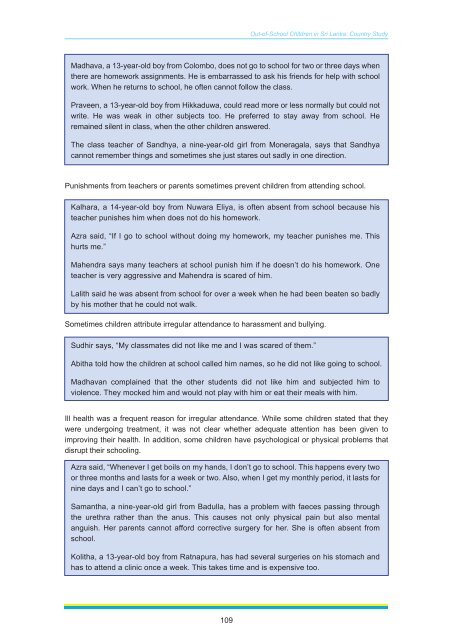Sri Lanka - Institut de statistique de l'Unesco
Sri Lanka - Institut de statistique de l'Unesco
Sri Lanka - Institut de statistique de l'Unesco
Create successful ePaper yourself
Turn your PDF publications into a flip-book with our unique Google optimized e-Paper software.
Out-of-School Children in <strong>Sri</strong> <strong>Lanka</strong>: Country Study<br />
Madhava, a 13-year-old boy from Colombo, does not go to school for two or three days when<br />
there are homework assignments. He is embarrassed to ask his friends for help with school<br />
work. When he returns to school, he often cannot follow the class.<br />
Praveen, a 13-year-old boy from Hikkaduwa, could read more or less normally but could not<br />
write. He was weak in other subjects too. He preferred to stay away from school. He<br />
remained silent in class, when the other children answered.<br />
The class teacher of Sandhya, a nine-year-old girl from Moneragala, says that Sandhya<br />
cannot remember things and sometimes she just stares out sadly in one direction.<br />
Punishments from teachers or parents sometimes prevent children from attending school.<br />
Kalhara, a 14-year-old boy from Nuwara Eliya, is often absent from school because his<br />
teacher punishes him when does not do his homework.<br />
Azra said, “If I go to school without doing my homework, my teacher punishes me. This<br />
hurts me.”<br />
Mahendra says many teachers at school punish him if he doesn’t do his homework. One<br />
teacher is very aggressive and Mahendra is scared of him.<br />
Lalith said he was absent from school for over a week when he had been beaten so badly<br />
by his mother that he could not walk.<br />
Sometimes children attribute irregular attendance to harassment and bullying.<br />
Sudhir says, “My classmates did not like me and I was scared of them.”<br />
Abitha told how the children at school called him names, so he did not like going to school.<br />
Madhavan complained that the other stu<strong>de</strong>nts did not like him and subjected him to<br />
violence. They mocked him and would not play with him or eat their meals with him.<br />
Ill health was a frequent reason for irregular attendance. While some children stated that they<br />
were un<strong>de</strong>rgoing treatment, it was not clear whether a<strong>de</strong>quate attention has been given to<br />
improving their health. In addition, some children have psychological or physical problems that<br />
disrupt their schooling.<br />
Azra said, “Whenever I get boils on my hands, I don’t go to school. This happens every two<br />
or three months and lasts for a week or two. Also, when I get my monthly period, it lasts for<br />
nine days and I can’t go to school.”<br />
Samantha, a nine-year-old girl from Badulla, has a problem with faeces passing through<br />
the urethra rather than the anus. This causes not only physical pain but also mental<br />
anguish. Her parents cannot afford corrective surgery for her. She is often absent from<br />
school.<br />
Kolitha, a 13-year-old boy from Ratnapura, has had several surgeries on his stomach and<br />
has to attend a clinic once a week. This takes time and is expensive too.<br />
109

















